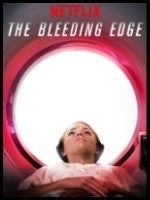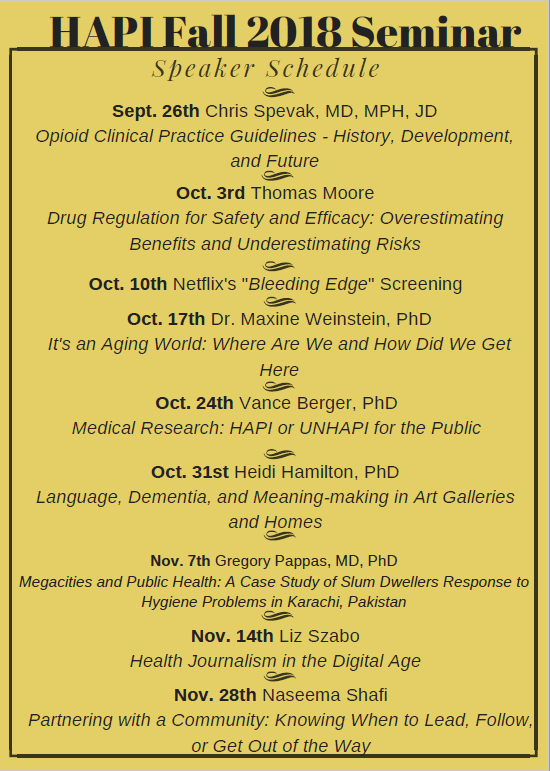Fall 2018 Seminar
The Fall 2018 Health and the Public Interest Seminar Series is a forum where the community can engage with key leaders

Dr. John H. Powers
Dr. Powers is a Professor of Clinical Medicine at the George Washington University School of Medicine. Prior to his current position, Dr. Powers was the lead medical officer for Antimicrobial Drug Development and Resistance Initiatives at the US Food and Drug Administration. While there, he was responsible for issues related to clinical trials and policy in antimicrobial research. Prior to joining the FDA, Dr. Powers was an assistant professor in the Division of Infectious Diseases at the University of Maryland School of Medicine. He is still on the faculty there as an Assistant Clinical Professor of Medicine and actively sees patients in clinic.
Dr. Powers is also a fellow at the American College of Physicians and the Infectious Diseases Society of America and has contributed to a variety of working groups and committees within the IDSA, the Veterans Administration, and the World Health Organization. He has also been an investigator on more than 50 clinical trials. He has particular expertise in the design, conduct, and analysis of clinical trials, and has published on various aspects of clinical trial design.

Dr. Christopher Spevak
Dr. Spevak is the Director of the National Capital Region’s Opioid Safety Program, and the Deputy Director of the National Capital Region Pain Initiative and Wounded Warrior Pain Care Initiatives. He is the Department of Defense chair of Opioid Clinical Practice Guideline (CPG) and representative to the Center of Disease Control for the DCD Opioid CPG. He advises and assists with the development of policies for clinical practice guideline implementation, safe opioid prescribing, prevention of opioid abuse and diversion, treatment of substance use disorder, and other related programs for Military Health System beneficiaries. He received his Medical degree from the Northeast Ohio Medical University and trained at the Cleveland Clinic and University of Pittsburgh Hospitals. He received a Master of Public Health degree in Health Management and Policy from the University of Michigan School of Public Health, and Law degree from the Catholic University of America. He is a Professor of Clinical Anesthesia at Georgetown University School of Medicine, and is a member of numerous medical and legal associations, and has also served as the 143rd President of the Medical Society of the District of Columbia.

Thomas Moore
Thomas Moore is a senior scientist at the Institute for Safe Medicine Practices, a non-profit organization that is dedicated to preventing medication errors, as well as public education and advocacy for safe medication practices. Before turning his focus to drug policy, he was an award-winning reporter in Washington and worked on the U.S. Senate staff. Today, Mr. Moore is a drug safety expert and has studied the intersections between medicine, science, business, government and law for almost 20 years. Additionally, he is the author of 4 books about medicine: Prescription for Disaster, Deadly Medicine, Lifespan: Who Lives Longer & Why, and Heart Failure. His other work has been published in various scientific journals.

Dr. Maxine Weinstein
Dr. Weinstein received her Bachelor of Science at Antioch College, and her Ph.D. from Princeton University. She is currently a professor at Georgetown University in the Graduate School of Arts and Sciences, where she has taught since 1987. Dr. Weinstein’s work focuses on the behavioral and biological dimensions of reproduction and health. She teaches courses in the Aging and Health graduate program, as well as the McCourt School of Public Policy. Along with teaching, she is currently working on two research projects funded by the NIH. One of her projects focuses on the reciprocal relationships between stress, health, and social environments among the elderly in Taiwan. She is also studying aspects of mid-life in the United States. Dr. Weinstein has also published over 90 published articles across highly accredited journals and books.

Dr. Vance Berger
Dr. Berger received degrees in Statistics from Cornell University, Stanford University, and Rutgers University. His professional career has included work in the pharmaceutical industry (Janssen Research Foundation, Theradex, and some consulting for Pfizer), work in two centers of the Food and Drug Administration (Drugs or CDER, and Biologics or CBER), and now Dr. Berger serves as a Mathematical Statistician for the National Cancer Institute. Dr. Berger has taught Statistics and Biostatistics at Rutgers University, the Johns Hopkins University School of Public Health, and the University of Maryland. He has published a book on clinical trial design and analysis, and served as editor to another. Dr. Berger is also an active researcher, having written numerous scientific articles on the design and analysis of clinical trials in peer reviewed journals. Dr. Berger has also presented numerous invited lectures on this subject and is always interested to discuss future collaboration.

Dr. Heidi Hamilton
Dr. Heidi Hamilton is an Olaf College alumna and received her masters and doctoral degrees from Georgetown University. Dr. Hamilton is currently a professor in the Department of Linguistics at Georgetown University, where she teaches courses in discourse analysis and applications of international sociolinguistics. Her research interests include Alzheimer’s disease, language and aging, and general health discourse. Dr. Hamilton has written and co-authored numerous works, including: Conversations with an Alzheimer’s Patient, Language and Communication in Old Age: Multidisciplinary Perspectives, and The Handbook of Language and Health Communication. Dr. Hamilton has received many awards for her works, including the Fulbright Distinguished Chair in Linguistics. She has travelled domestically and internationally to present her lectures and research.

Dr. Gregory Pappas
Gregory Pappas, MD PhD is the Associate Director for Medical Device Surveillance at the FDA Center for Devices and Radiological Health (CDRH). He previously served as the Senior Deputy Director of HAHSTA (HIV/AIDS, Hepatitis, STD, and TB Administration) for the District of Columbia, Department of Health. He has worked professionally in over 30 countries. Dr. Pappas served as the Noordin M. Thobani Professor at the Aga Khan University (AKU), where he was the Chairman of the Department of Community Health Sciences in Karachi, Pakistan. While serving as Medical Director of the Futures Group, he designed and implemented the monitoring and evaluation plan for the antiretroviral program of AIDS Relief, working in nine countries in Africa and the six countries in the Caribbean. Dr. Pappas served in a variety of positions over a 17 year period in the Department of Health and Human Services including his role as Senior Policy Advisor to the Assistant Secretary for Health/Surgeon General, David Satcher. For ORC Macro, as Deputy Director of the Demographic and Health Survey (DHS), he planned and implemented innovative surveys in Uganda, Mali, Uzbekistan, and Dominican Republic. At NCHS, he worked on many of the large national data systems and led the National Health Survey of Pakistan, a nationally representative health examination survey of over 16,000 sample persons.
Dr. Pappas is author of numerous articles, including his work in the New England Journal of Medicine “The increasing disparity in mortality between socioeconomic groups in the United States” and his book with Cornell University Press, “The Magic City: unemployment in a working class community.” Dr. Pappas also served as Chair of the Science Board and member of the Executive Board of the American Public Health Association. His book “Megacities and Global Health” (APHA Press) with Omar Khan was published in 2012.

Liz Szabo
Liz Szabo is a senior correspondent at Kaiser Health News, a nonprofit newsroom and an editorially independent program of the Kaiser Family Foundation. She is a member of the enterprise team focusing on quality of care, particularly acute care of the aging, including cancer, heart disease other issues. While at Kaiser Health News, she has written series such as “Treating Cancer: Hope vs. Hype” and “Treatment Overkill,” which examine the epidemic of unnecessary care and its consequences for patient health and finances. Before joining KHN, she covered health at USA TODAY for more than 12 years. Liz has also worked for The Virginian-Pilot in Norfolk, VA. Her work at USA TODAY was awarded the Cohn Prize in Medical Science Reporting from the Council for the Advancement of Science Writing.

Naseema Shafi
As Deputy Executive Director of Whitman-Walker Health, Naseema Shafi works closely with the executive director to implement strategic initiatives of the board of directors. She supports the oversight of all clinical, programmatic and operational areas of the health center. She also oversees the health center’s long-term facility planning, and Population Health and Quality department – two areas which work to improve health outcomes and patient satisfaction. Lastly, she supervises the human resources, information technology, and property management functions. She has been at the health center since 2007 and is in her fourth role there. She completed her undergraduate degree at the University of Maryland, College Park and her law degree from the University of Maryland, School of Law, and is a member of the Maryland State Bar. She is the proud member of the 2016 class of Minority Business Leaders as awarded by The Washington Business Journal in 2016.

The Bleeding Edge: A Netflix Documentary
Many are aware of the power of the pharmaceutical industry in the United States, but less are aware of the ins and outs of the medical device industry. Arguably more powerful and historically less regulated than its pharmaceutical counterpart, the medical device world has led both to a slew of life saving innovations, but also its fair share of tragedies. In The Bleeding Edge, academy award winning filmmakers Kirby Dick and Amy Ziering examine this dichotomy, and peel back the lid on an industry most never even think about, until it affects them. As Netflix itself summarizes: “In the booming medical device world, everyone’s chasing the next hot technology. But too often, “new” means “untested” – and patients pay the price.”

